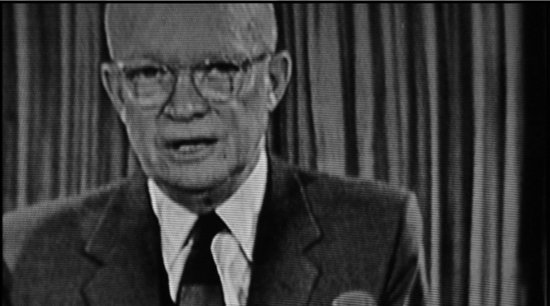“So what does real reform look like? There is no simple answer or silver bullet. If history is any judge, each round of ethics reforms lasts only a few years before lobbyists, lawyers and lawmakers pierce it full of holes. But ethics crusaders still hope to capitalize on this rare political moment, hurled forth on a powerful wave of corruption scandals plaguing the Republican Party.” Salon‘s Michael Scherer outlines five lobbying reforms that’ll determine whether Congress is serious about cleaning up the system in the wake of Casino Jack.
Category: The Dubya Era
Fight Club.
“In the councils of government, we must guard against the acquisition of unwarranted influence, whether sought or unsought, by the military-industrial complex. The potential for the disastrous rise of misplaced power exists and will persist. We must never let the weight of this combination endanger our liberties or democratic processes.” That flaming liberal Dwight Eisenhower’s somber farewell address to the nation is the historical and thematic anchor for Eugene Jarecki’s documentary Why We Fight, a sobering disquisition on American militarism and foreign policy since 9/11. In essence, Why We Fight is the movie Fahrenheit 9/11 should have been. Like F911, this film preaches to the choir, but it also makes a more substantive critique of Dubya diplomacy and the 9/11-Iraq switcheroo, with much less of the grandstanding that marred Moore’s earlier documentary (and drove right-wing audiences berzerk.)
Sadly, the basic tale here is all-too-familiar by now. Ensconced in Dubya’s administration from the word go, the right-wing think-tank crowd (Wolfowitz, Perle, Kristol, etc.) used the tragedy of 9/11 as a pretext to enact all their neocon fantasies (spelled out in this 2000 Project for a New American Century report), beginning in Iraq. Taken into consideration with Cheney the Military-Contractor-in-Chief doling out fat deals to his Halliburton-KBR cronies from the Vice-President’s office, and members of Congress meekly signing off on every military funding bill that comes down the pike (partly because, as the film points out, weapons systems such as the B-1 or F-22 have a part built in every state), it seems uncomfortably clear that President Eisenhower’s grim vision has come to pass.
To help him rake this muck, Jarecki shrewdly gives face-time not only to learned critics of recent foreign-policy — CIA vet Chalmers Johnson, Gore Vidal (looking unwell) — but also to the neocons themselves. Richard Perle is here, saying (as always) insufferably self-serving things, and Bill Kristol glows like a kid in a candy store when he gets to talk up his role in fostering Dubya diplomacy. (Karen Kwiatkowski, a career military woman who watched the neocon coup unfold within the corridors of the Pentagon, also delivers some keen insights.) And, when discussing the corruption that festers in the heart of our Capitol, Jarecki brings out not only Charles Lewis of the Center for Public Integrity but that flickering mirage of independent-minded Republicanism, John McCain. (In fact, Jarecki encapsulates the frustrating problem with McCain in one small moment: Right after admitting to the camera that Cheney’s no-bid KBR deals “look bad”, the Senator happens to get a call from the Vice-President. In his speak-of-the-devil grimace of bemused worry, you can see him mentally falling into line behind the administration, as always.)
To be sure, Why We Fight has some problems. There’s a central tension in the film between the argument that Team Dubya is a corrupt administration of historical proportions and the notion that every president since Kennedy has been party to an increasingly corrupt system, and it’s never really resolved satisfactorily here. Jarecki wants you to think that this documentary is about the rise of the Imperial Presidency across five decades, but, some lip service to Tonkin notwithstanding, the argument here is grounded almost totally in the Age of Dubya. (I don’t think it’s a bad thing, necessarily, but it is the case.) And, sometimes the critique seems a little scattershot — Jarecki seems to fault the Pentagon both for KBR’s no-bid contracts and, when we see Lockheed and McDonnell-Douglas salesmen going head-to-head, for bidding on contracts. (Still, his larger point is valid — As Chalmers Johnson puts it, “When war becomes that profitable, you’re going to see more of it.“)
Also, the film loses focus at times and meanders along tangents — such as the remembrances of two Stealth Fighter pilots on the First Shot Fired in the Iraq war, or the glum story of an army recruit in Manhattan looking to turn his life around. This latter tale, along with the story of Wilton Sekzer, a retired Vietnam Vet and NYPD sergeant who lost his son on 9/11 and wants somebody to pay, are handled with more grace and less showmanship than similar vignettes in Michael Moore’s film, but they’re in the same ballpark. (As an aside, I was also somewhat irked by shots of NASA thrown in with the many images of missile tests and ordnance factories. Ok, both involve rockets, research, and billions of dollars, but space exploration and war are different enough goals that such a comparison merits more unpacking.)
Nevertheless, Why We Fight is well worth-seeing, and hopefully, this film will make it out to the multiplexes. If nothing else, it’ll do this country good to ponder anew both a president’s warning about the “disastrous rise of misplaced power,” and a vice-president’s assurance that we’ll be “greeted as liberators.”
“The Power-Madness of King George.”
 “This extremity of Bush’s position emerges most clearly in a 42-page document issued by the Department of Justice last week. As Andrew Cohen, a CBS legal analyst, wrote in an online commentary, ‘The first time you read the “White Paper,” you feel like it is describing a foreign country guided by an unfamiliar constitution.’ To develop this observation a bit further, the nation implied by the document would be an elective dictatorship, governed not by three counterpoised branches of government but by a secretive, possibly benign, awesomely powerful king.” As Dubya embarks on another weeklong campaign of fear and distortion (as per standard Rovian operating procedure), Slate‘s Jacob Weisberg gapes at the audacity of Bush’s brazenly unconstitutional ploy for power. “[I]n his white paper, Bush as much as declares: ‘I determine what my words mean and I alone determine what yours mean, too.’…Bush’s message to the courts, like his message to Congress, is: Make way, subjects.“
“This extremity of Bush’s position emerges most clearly in a 42-page document issued by the Department of Justice last week. As Andrew Cohen, a CBS legal analyst, wrote in an online commentary, ‘The first time you read the “White Paper,” you feel like it is describing a foreign country guided by an unfamiliar constitution.’ To develop this observation a bit further, the nation implied by the document would be an elective dictatorship, governed not by three counterpoised branches of government but by a secretive, possibly benign, awesomely powerful king.” As Dubya embarks on another weeklong campaign of fear and distortion (as per standard Rovian operating procedure), Slate‘s Jacob Weisberg gapes at the audacity of Bush’s brazenly unconstitutional ploy for power. “[I]n his white paper, Bush as much as declares: ‘I determine what my words mean and I alone determine what yours mean, too.’…Bush’s message to the courts, like his message to Congress, is: Make way, subjects.“
In related news, Senate opposition to the Patriot Act — All the Dems and only four measly Republicans — seems to be holding firm for now, meaning that the old, unrevised version will remain in effect for the time being. Of course, if King George actually possessed the powers he’s arrogantly allocated to himself of late, there would be no need for a Senate vote on the Patriot Act at all. Hopefully, Arlen Specter understands the danger in these breathtaking assertions of unconstitutional power by Dubya, and will make his forthcoming Senate Judiciary hearings count for something. After all, given this administration’s blatant power grab, it’s no longer hyperbole to say that our republic is at stake.
Don’t Need a Weatherman.
“I don’t think anybody anticipated the breach of the levees.” Really, Dubya? As Looka and the WP point out, two different government reports suggested the damage Katrina would cause to New Orleans in the days before it hit. “The NISAC paper warned that a storm of Katrina’s size would ‘likely lead to severe flooding and/or levee breaching’ and specifically noted the potential for levee failures along Lake Pontchartrain.. So, yet again, the president has lied to the American people and stonewalled congressional investigations into his actions. They used to call these impeachable offenses — Now, we call them Wednesday.
All Ears (and No Earmarks).
“‘In 1994, when the Congress was taken over by Republicans, there were 4,000 earmarks on appropriations bills,’ [McCain] told the committee. ‘Last year there were 15,000. It’s disgraceful, this process.'” A Senate Committee chaired by Susan Collins and Joe Lieberman began discussing the Senate’s post-Abramoff cleanup today, with McCain, Feingold and others calling for systematic and comprehensive reform, including the end of “earmarking” (i.e. adding pork to appropriations bills.) “McCain said he was especially bothered that at the end of the last congressional session, various extraneous appropriations were ‘larded onto the money that was supposed to be devoted to the men and women in the military and their ability to conduct the war on terror.’“
Uncle Sam, or Big Brother?
“Judge Alito’s record and his testimony have led me to conclude that his impulse to defer to the executive branch would make him a dangerous addition to the Supreme Court at a time when cases involving executive overreaching in the name of fighting terrorism are likely to be such an important part of the Court’s work.” Although the Senate Judiciary Dems (including Feingold) lined up against him, Sam Alito made it out of committee on a 10-8 party-line vote. Now, with his nomination before the full Senate, and with Nebraska Dem Ben Nelson joining the GOP majority, it seems, unfortunately, that the “worst nightmare of liberal democrats” will come to pass, and Alito will join the Roberts court. (For what it’s worth, Nelson wasn’t alone in his apostasy: Santorum challenger Bob Casey also came out for the judge.) Well, let’s hope Justice Alito takes a less forgiving look at executive encroachment than has Judge Alito. (Casey link via Medley.) Update: While the NYT says filibuster, Dems Robert Byrd and Tim Johnson back Alito. (Of course, if the NYT hadn’t sat on the NSA story for a year, perhaps we could have nipped Alito in the bud back in November 2004.)
Send in Sgt. Brockovich.
“The water expert said he told company officials at the base that they would have to notify the military. ‘They told me it was none of my concern and to keep my mouth shut,’ he said.” Ah, the perks of a no-bid contract. As e-mail records prove, those patriots at Halliburton, Dick Cheney’s favorite corporate cronies, have been knowingly exposing some soldiers to contaminated water, despite being warned by their own employees about the danger. “Another former Halliburton employee who worked at the base, Ken May of Louisville, said there were numerous instances of diarrhea and stomach cramps.”
Dubya Justice / The Way of Payne.
“The voting section is always subject to political pressure and tension. But I never thought it would come to this…I was there in the Reagan years, and this is worse.” With the help of former career officials who’ve resigned in disgust, the Post delves deeper into the partisan corruption of the Justice Department’s Civil Rights Division on Dubya’s watch. “The Bush administration has…initiated relatively few cases under Section 2, the main anti-discrimination provision of the Voting Rights Act, filing seven lawsuits over the past five years — including the department’s first reverse-discrimination complaint on behalf of white voters…By comparison, department records show, 14 Section 2 lawsuits were filed during the last two years of Bill Clinton’s presidency alone.“
And, in related news, Salon‘s Will Evans uncovers a crooked Dubya-appointed federal judge, James Payne of the 10th Court of Appeals. Apparently Judge Payne “issued more than 100 orders in at least 18 cases that involved corporations in which he owned stock,” which, obviously, is illegal. “‘There’s no wriggle room here,’ says professor Stephen Gillers, a scholar of legal ethics at the New York University School of Law. ‘It’s not just an ethics rule, it’s a congressional statute — a law.’” Little wonder the administration is running scared from pics of Casino Jack — they’ve already got the stink of Abramoff-style cronyism and corruption all over them.
Rove: Feel the Fear.
“The curtain got pulled aside, and there’s not even a wizard behind it…these people are incompetent.” As you probably heard, Karl Rove emerged from hiding to offer his blueprint for Republican resurgence in 2006. Yep, you guessed it: terror, terror, terror, 9/11, 9/11, 9/11, garnished with a smattering of tax cuts. But, to their credit, it sounds like Dems are relishing this coming fight, with Intelligence Committee Dem Jane Harman pushing back once more on the illegal wiretaps, and, in keeping with the recent trend of presidential also-rans finding their voice, John Kerry taking off the gloves on the Sunday shows. “Osama bin Laden is going to die of kidney failure before he’s killed by Karl Rove and his crowd.“
The Kennedy Era.
“While it’s true that O’Connor has tended to vote with the majority more frequently than Kennedy, and that she has done so in some big 5-4 decisions, it’s also true that in other extremely contentious areas, it is Kennedy, not O’Connor, who has swung the court leftward.” As Dem begin to announce their no votes for Alito (while downplaying the likelihood of a filibuster), Dahlia Lithwick — who is concerned about Alito’s judgment in the relatively precedent-less world of anti-terror-law — gives us hope for the Court’s future in highlighting Anthony Kennedy as the new swing vote. (Clearly, the psycho-right despises him, which speaks well of his jurisprudence in my book.)



